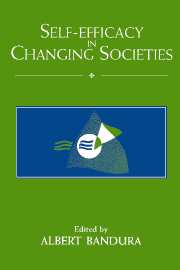Book contents
- Frontmatter
- Contents
- Foreword
- Preface
- List of contributors
- 1 Exercise of personal and collective efficacy in changing societies
- 2 Life trajectories in changing societies
- 3 Developmental analysis of control beliefs
- 4 Impact of family processes on control beliefs
- 5 Cross-cultural perspectives on self-efficacy
- 6 Self-efficacy in stressful life transitions
- 7 Self-efficacy and educational development
- 8 Self-efficacy in career choice and development
- 9 Changing risk behaviors and adopting health behaviors: The role of self-efficacy beliefs
- 10 Self-efficacy and addictive behavior
- Name Index
- Subject Index
4 - Impact of family processes on control beliefs
Published online by Cambridge University Press: 04 August 2010
- Frontmatter
- Contents
- Foreword
- Preface
- List of contributors
- 1 Exercise of personal and collective efficacy in changing societies
- 2 Life trajectories in changing societies
- 3 Developmental analysis of control beliefs
- 4 Impact of family processes on control beliefs
- 5 Cross-cultural perspectives on self-efficacy
- 6 Self-efficacy in stressful life transitions
- 7 Self-efficacy and educational development
- 8 Self-efficacy in career choice and development
- 9 Changing risk behaviors and adopting health behaviors: The role of self-efficacy beliefs
- 10 Self-efficacy and addictive behavior
- Name Index
- Subject Index
Summary
The focus of this chapter is on the structural and process-oriented aspects of family life that are expected to have an influence on children's and adolescents' acquisition of control beliefs or, more specifically, on the development of self-efficacy and outcome expectations. After dealing with some theoretical and assessment issues, I will review available research on this topic with a special emphasis on parenting and relevant conditions that influence the parenting process. In addition, I will occasionally intersperse some results from my own research to illustrate in somewhat greater detail how I have tried to address various questions pertaining to this topic. Finally, after demonstrating that a fuller understanding of the development of personal control beliefs makes it necessary to include influences that are beyond the family system, I will briefly comment on an integrative model that might serve as a guide for further research in this field.
Self-efficacy and other control-related constructs
Recent theorizing in the behavioral and social sciences underscores the need for overarching principles concerning factors that motivate and guide human behavior. Among these approaches, Bakan's (1966) seminal work on the “duality of human existence” and his two concepts of “communion” and “agency” have become quite popular in recent years (e.g., McAdams, 1988; Wiggins, 1991). In McAdam's (1988, p. 12) words:
Agency refers to the organism's striving to consolidate its individuality, to separate from other organisms, to master the surroundings, to assert, protect, and expand the self. […]
- Type
- Chapter
- Information
- Self-Efficacy in Changing Societies , pp. 114 - 148Publisher: Cambridge University PressPrint publication year: 1995
- 55
- Cited by



